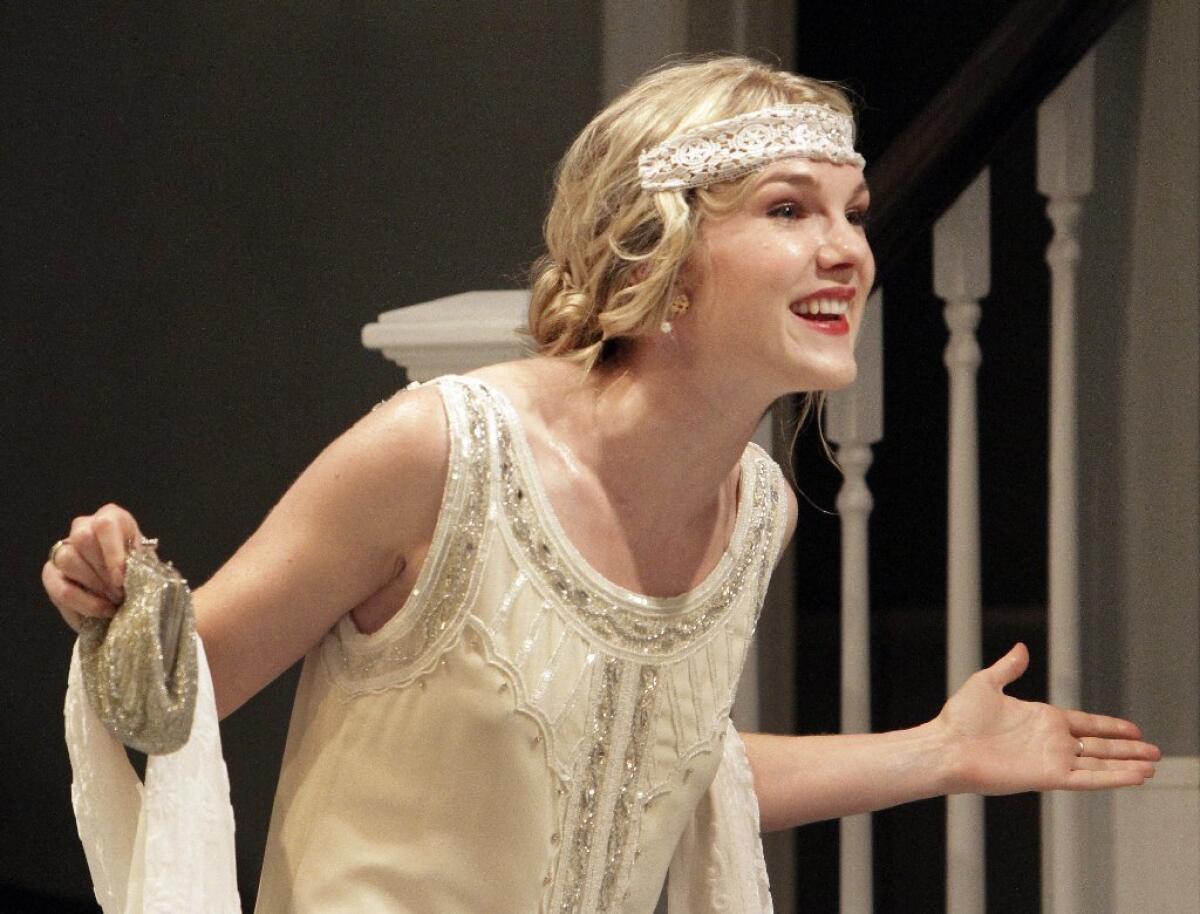Theater review: Neil LaBute’s take on ‘Miss Julie’ is uneasy hybrid

- Share via
August Strindberg’s “Miss Julie,” a key landmark of modern drama, has been getting quite the workout from contemporary theater artists drawn to this tale of an unstable aristocrat’s disastrous one-night affair with her ambitious servant.
British playwright Patrick Marber relocated the story to an English country house at the end of the Second World War in his play “After Miss Julie.” Playwright and director Yael Farber updated the saga to post-apartheid South Africa in her theatrically intense “Mies Julie.”
Now Neil LaBute, American theater’s perennial bad boy (“Fat Pig,” “Reasons to Be Pretty”), has transferred the action to the Jazz Age Long Island of F. Scott Fitzgerald’s “The Great Gatsby” just before the stock market crash in his thoroughly weird “Miss Julie,” which opened Wednesday at the Geffen Playhouse’s Audrey Skirball Kenis Theater.
The strangeness of this production, directed by Jo Bonney, could be discerned in the chuckling of the audience as Lily Rabe’s Julie entered the final stages of her tragic descent. Strindberg has been called many things (“mad genius,” “misogynist”) but “laugh riot” is not one of them.
It wouldn’t be correct to say that LaBute and Bonney take a screwball approach to a naturalistic tragedy, but the setting, familiar to viewers of Turner Classic Movies, turns the gravitas into melodramatic camp. Despite their hoity-toity Long Island and tough-guy New York accents, these characters maintain their harebrained conviction that they’re in a Strindberg play. Quick, somebody tell them North Shore princesses don’t really take a razor to their throats over a drunken tumble with their daddy’s valet!
At the start of the play, “Let’s Misbehave” tinkles portentously from a radio in the glamorously spacious kitchen (fetchingly designed by Myung Hee Cho). Kristine (Laura Heisler), the cook who speaks in what might be an old Hollywood version of an Irish American brogue, is busy preparing some specialty dog food for her mistress’ bitch.
CHEAT SHEET: Spring Arts Preview
Petty and passive-aggressive, she keeps a watchful eye on her fellow employee and bedmate John (Logan Marshall-Green), a slick striver with a Marlon Brando mumble and a determination to break out of the servants’ quarters.
Into this scene walks Julie, still wearing a flapper’s dress after a night of crazy partying on her father’s estate. Flailing after a botched engagement, she is impressed by John’s pseudo-sophistication and intrigued by his masculine arrogance. They engage in a pas de deux that is as explicitly erotic as it is openly hostile.
Lured by each other’s power, they are repelled by each other’s weaknesses — though not enough to prevent them from sleeping together in a little room off the kitchen. In keeping with Strindberg’s original vision, sex is hardly a bridge for divided souls. Gender and class clash violently, as two characters — one rising, the other falling — catastrophically converge.
Strindberg was an unsparing psychologist who tapped into the intellectual currents of Darwin, Nietzsche and Marx to instigate a revolution in the theater. The complexity of his characters, beset with internal contradictions and at the mercy of external forces, was a principled stand against the arch stereotypes and wooden caricatures that dominated the 19th century European stage.
PHOTOS: Hollywood stars on stage
It may be hard to recapture what was once so radical, but LaBute actually makes this 1888 masterpiece seem like a throwback to the melodrama Strindberg vociferously disdained. There are no direct parallels between 20th century American society and that of stratified late 19th century Sweden. The surest way to rekindle the work’s “relevance” — vacuous term, I know — is to honor the context provided by the writer.
What LaBute offers here is an uneasy hybrid in which even the language of the play is an awkward mishmash of words and mouths. Bonney’s production compounds the problem by casting actors whose styles are glaringly mismatched.
Rabe is already an accomplished stage actress (only fitting given that she’s the daughter of Jill Clayburgh and playwright David Rabe), having won Broadway acclaim for her work in “The Merchant of Venice” opposite Al Pacino and in Theresa Rebeck’s “Seminar” opposite Alan Rickman. But her haughty and histrionic flamboyance seems ungainly in this intimate space, especially when contrasted with the wishy-washy narcissism of Marshall-Green’s John, a performance that appears pitched to some invisible camera.
Heisler’s acting adds yet another jangling note of discordance. She tries to play Kristine in a realistic fashion, but there’s something fundamentally detached from reality about her unplaceable characterization.
This “Miss Julie” is a misguided enterprise that might have been more interesting had LaBute taken a freer hand with the material. He certainly shares an antagonistic streak with Strindberg, but it’s tamed in this refurbishing of a classic that I’m sorry to see come off as just plain silly.
More to Read
The biggest entertainment stories
Get our big stories about Hollywood, film, television, music, arts, culture and more right in your inbox as soon as they publish.
You may occasionally receive promotional content from the Los Angeles Times.











